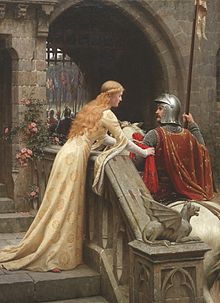
Back Hoofse liefde Afrikaans Minne ALS حب نبيل Arabic Куртоазна любов Bulgarian Amor cortès Catalan Serch llys Welsh Minne German Αυλικός έρωτας Greek Korteza amo Esperanto Amor cortés Spanish

Courtly love (Occitan: fin'amor [finaˈmuɾ]; French: amour courtois [amuʁ kuʁtwa]) was a medieval European literary conception of love that emphasized nobility and chivalry. Medieval literature is filled with examples of knights setting out on adventures and performing various deeds or services for ladies because of their "courtly love". This kind of love was originally a literary fiction created for the entertainment of the nobility, but as time passed, these ideas about love spread to popular culture and attracted a larger literate audience. In the high Middle Ages, a "game of love" developed around these ideas as a set of social practices. "Loving nobly" was considered to be an enriching and improving practice.[1][2]
Courtly love began in the ducal and princely courts of Aquitaine, Provence, Champagne, ducal Burgundy and the Norman Kingdom of Sicily[3] at the end of the eleventh century. In essence, courtly love was an experience between erotic desire and spiritual attainment, "a love at once illicit and morally elevating, passionate and disciplined, humiliating and exalting, human and transcendent".[4] The topic was prominent with both musicians and poets, being frequently used by troubadours, trouvères and Minnesänger. The topic was also popular with major writers, including Dante, Petrarch and Geoffrey Chaucer.
The term "courtly love" was first popularized by Gaston Paris and has since come under a wide variety of definitions and uses. Its interpretation, origins and influences continue to be a matter of critical debate.
| Part of a series on |
| Love |
|---|
- ^ Stevens, John (1979). Music & Poetry in the Early Tudor Court. New York: Cambridge University Press. ISBN 0-521-29417-7.
- ^ Newman, F. X., ed. (1968). The Meaning of Courtly Love. Albany: State University of New York. ISBN 0-87395-038-0.
- ^ Ousby, I., ed. (1995). "Courtly Love". The Cambridge Guide to Literature in English. p. 213.
- ^ Newman, Francis X., ed. (1968). The Meaning of Courtly Love. vii. ISBN 0-87395-038-0.
© MMXXIII Rich X Search. We shall prevail. All rights reserved. Rich X Search
